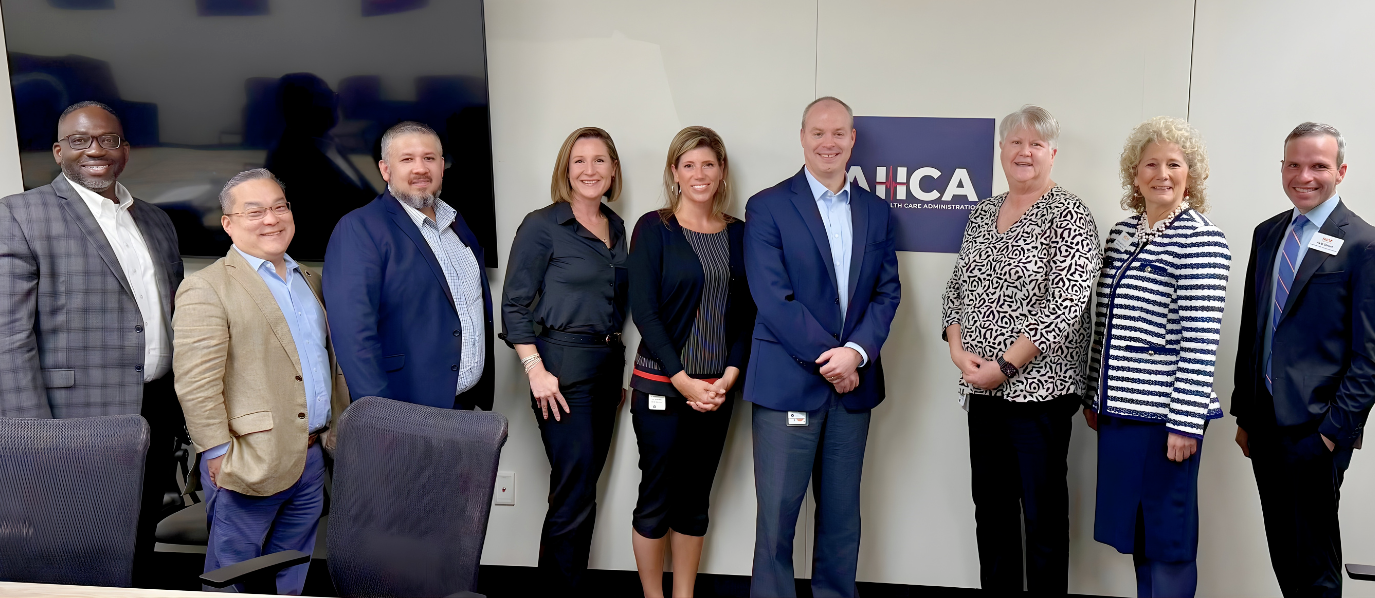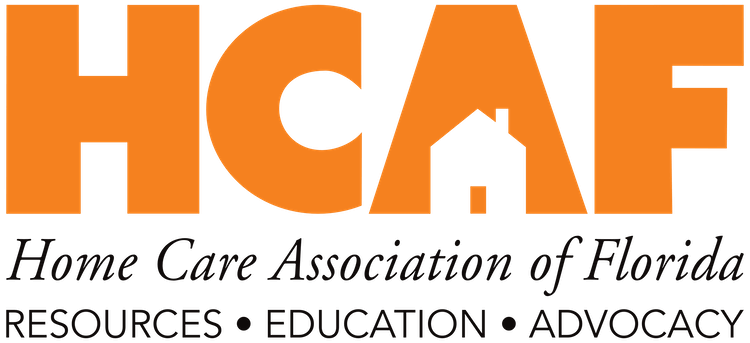AHCA Quarterly Meeting Recap: Advancing Policy, Strengthening Collaboration

AHCA Quarterly Meeting Recap: Advancing Policy, Strengthening Collaboration
On Monday, October 20, 2025, the HCAF policy team met with senior leadership of the Agency for Health Care Administration (AHCA) at the Agency’s headquarters in Tallahassee for its regularly scheduled quarterly policy and regulatory meeting. These meetings serve as a critical touchpoint between Florida’s state regulators and the home care provider community, enabling HCAF to bring member concerns directly to decisionmakers, shape regulatory conversations, and receive timely updates on rulemaking, policy priorities, and program implementation.
HCAF Representatives | AHCA Representatives |
|---|---|
|
|
During the meeting, HCAF and AHCA engaged in a series of substantive discussions and received important updates on key policy and regulatory issues affecting Florida’s in-home care sector. The agenda reflected both immediate operational concerns raised by providers and longer-term priorities shaping the future of home care delivery in the state, which are outlined below in detail.

Emergency Flexibilities and Coordination
A key topic of discussion revisited an issue first raised during the October 2024 quarterly meeting: the need for greater emergency flexibilities and more structured coordination between AHCA and the home care provider community during declared disasters. HCAF stressed that home health agencies play an essential role in continuity of care during hurricanes, public health emergencies, and other crises, often bridging the gap between hospitals and the home.
AHCA expressed a willingness to review and consider HCAF’s “wish list” of recommended flexibilities to streamline communication, improve operational adaptability during emergencies, and reduce administrative burdens for providers. Following the meeting, HCAF formally submitted its proposed recommendations for review.
Direct Care Workforce Survey Transparency
HCAF continued its advocacy for the public posting of the Direct Care Workforce Survey, which was established under HB 607 (2020) and is required of all home health agencies, nursing homes, assisted living facilities, and homemaker and companion service providers at license renewal. By law, AHCA must make this data publicly available on its website, but it has not yet been posted. HCAF emphasized the strategic importance of these findings for advocacy and workforce development: publicly available data can help pinpoint the geographic areas with the most severe workforce shortages, allowing targeted collaboration with workforce development organizations and state partners.
AHCA confirmed its intention to publish the survey results in the near future. HCAF will continue to press the Agency until the posting and ongoing updates are made routine.
Improving the Licensure Application Process
Another issue addressed was a longstanding operational challenge for providers: the inability to make changes to a licensure application once it is under review. AHCA explained that the system currently “locks” applications during this period. HCAF proposed that providers be allowed to make edits electronically, ensuring more efficient and accurate processing.
In response, AHCA outlined a workaround that enables providers to submit changes via paper application during the review period. This clarification offers a practical option for moving forward during the transition period, easing administrative burdens, and supporting provider efficiency. Providers may submit the paper application, along with all required documentation, to HQAHOMEHEALTH@ahca.myflorida.com.
Previewing HCAF’s 2026 Legislative Priorities
HCAF also shared its proposed legislative priorities for the 2026 Florida Legislative Session, which convenes in January. In addition to a Medicaid reimbursement rate increase request, HCAF is proposing legislation to strengthen consumer protections and increase transparency and accountability across Florida’s in-home care sector. AHCA leadership welcomed the early notification and agreed to review the draft bill.
Consumer Guide Collaboration
Building on earlier conversations, HCAF presented its draft consumer guide for in-home care, designed to help Floridians clearly understand the distinctions between home health agencies, nurse registries, homemaker and companion service providers, and independent caregivers. The proposed guide also aims to highlight consumer safeguards and prompt families to ask the right questions before choosing a provider.
AHCA shared that it has its own draft under development but expressed openness to reviewing HCAF’s recommendations and potentially incorporating them into the Agency’s final product. This collaboration represents another way HCAF is positioning the home care sector as a constructive partner in improving consumer protection and transparency.
Implementation of HB 1353
The meeting included a focused discussion on the implementation of HB 1353, HCAF’s top legislative priority during the 2025 session. Effective July 1, 2025, the new law:
- Allows a single administrator to oversee multiple home health agencies under the same ownership, regardless of geographic location.
- Expands the ability of agencies to utilize qualified contracted clinicians for admission, evaluation, and discharge visits.
- Requires AHCA to revamp the Excellence in Home Health Award program to better reflect the diversity of agency types and payer mixes.
To implement these provisions, rulemaking is underway to update Rule 59A-8.0095 (Personnel), Rule 59A-8.008 (Scope of Services), and Rule 59A-8.0248 (Excellence in Home Health). HCAF has been an active participant in this rule development process, including the rule workshop held on September 4, 2025, where we submitted recommended award criteria for the updated recognition program. While AHCA’s 2025–2026 Regulatory Plan currently targets January 2026 for finalization, the Agency has indicated it is aiming to complete the process sooner — potentially by late fall.
Importantly, providers may begin implementing HB 1353 now. Under §120.54(1)(c), Florida Statutes, no statutory provision may be delayed in its implementation pending rulemaking unless expressly prohibited — and HB 1353 includes no such prohibition.
However, HCAF strongly encourages providers to:
- Follow the statutory language closely.
- Document compliance efforts.
- Seek written clarification from AHCA if uncertainties arise.
- Stay engaged in the rulemaking process to ensure alignment with the final regulations.
HCAF will continue to monitor and share rulemaking updates as they are announced.
Data Breach Transparency Rulemaking
HCAF also engaged AHCA on its proposed Data Breach Transparency rule (Rule 59A-35.112), which would require licensed providers to report information technology (IT) incidents within 24 hours of reasonably believing one may have occurred.
Prior to the meeting, HCAF submitted detailed written comments outlining concerns that a 24-hour reporting requirement could create operational and compliance challenges for providers, particularly smaller agencies with limited IT resources.
At the meeting, HCAF reiterated its recommendation that AHCA align the reporting timeline with the Florida Information Protection Act (FIPA), which allows a 30-day notification period for confirmed breaches. AHCA confirmed that it is reviewing all stakeholder feedback and written comments before finalizing the rule.
Family Home Health Aide Program
The Family Home Health Aide (FHHA) program, significantly strengthened under SB 1156 this past session, was a major discussion item. AHCA confirmed that rulemaking for Rule 59A-8.0099 (Minimum Training Requirements) is ongoing, with anticipated finalization in early 2026, though the Agency hopes to move faster.
Importantly, AHCA confirmed that providers will not be required to submit the FHHA annual report on November 1 this year, as this reporting requirement is expected to be eliminated in the forthcoming rule.
HCAF also raised concerns about inconsistent Medicaid managed care plan authorizations for FHHA services. Several plans have demonstrated confusion about program requirements and, in some cases, approved services in ways that conflict with legislative intent. Medicaid staff were receptive to these concerns and asked HCAF to share best practices from providers successfully implementing the program to help guide further plan education and alignment. HCAF has since submitted these best practices to support AHCA’s efforts to ensure consistency across all plans.
1115 Waiver Amendment Status
HCAF and AHCA discussed the status of the Managed Medical Assistance 1115 Waiver amendment request, which would exclude FHHA wages from Medicaid eligibility determinations and authorize Private Duty Nursing (PDN) Specialty providers to participate in the program. The waiver remains under federal review. While the decision timeline may be affected by the federal government shutdown, HCAF will continue to monitor developments and inform members of any updates.
Rural Health Transformation Program
HCAF closed the substantive discussion by highlighting its formal recommendations regarding Florida’s application to the Rural Health Transformation Program (RHTP) — a federal initiative was established under the One Big Beautiful Bill Act of 2025. The program allocates $50 billion nationwide to support rural health initiatives through innovative care models, expanded technology, and workforce development.
In its written submission, HCAF urged AHCA to make home health agencies a central part of Florida’s application strategy, outlining several key recommendations:
- Mobile clinician units to expand access to in-home care in rural communities.
- Hospital-to-home partnerships to improve care transitions and reduce readmissions.
- Expanded telehealth and remote monitoring to enhance chronic disease management.
- Workforce recruitment and training incentives to strengthen the rural care pipeline.
- A Rural Home Health Technology Fund to modernize electronic health records and cybersecurity infrastructure.
AHCA acknowledged receipt of HCAF’s recommendations and confirmed that the state’s application deadline is November 5, 2025, with funding awards expected by year-end. If Florida’s application is approved, AHCA plans to launch a competitive application process to distribute funds to eligible providers and programs across the state.
Advancing Advocacy Through Strategic Engagement
HCAF concluded the meeting by inviting AHCA leadership — including Secretary Shevaun Harris — to participate in a Medicaid-funded home care visit in the near future. These visits provide lawmakers and agency officials with a firsthand understanding of how in-home care delivers high-quality, cost-effective services to vulnerable Floridians in the setting they prefer most: their homes.
“This quarterly engagement is a cornerstone of our advocacy strategy,” said HCAF Executive Director Denise Bellville, RN, BS. ”By meeting directly with AHCA leadership, we ensure that home care providers have a strong, unified voice in the policymaking process and that state regulators fully understand the realities of care delivery in the home.”
This meeting underscores the power of collective advocacy through HCAF. Through structured, ongoing engagement with state regulators, HCAF ensures that the concerns and priorities of Florida’s home care community are not only heard but meaningfully influence the policy and regulatory landscape.
HCAF will continue to monitor and report on all developments discussed during the meeting and actively engage with AHCA to ensure that home care providers remain at the forefront of Florida’s evolving health care system.
